I want to call this the “Lost Blogs” Series. These are notes I penned down while traveling which got lost in the digital abyss. It’s only recently, when I went through my old hard drives, that I uncovered them. Here is the first of the collection….
I woke up with a start. It was 3AM. The defeaning clackety-clack of the train wheels was matched only by the symphony of snores around me. We were on a night train heading to our next destination. But I wasn’t focussed on the destination. Nor the noise. My mind was agog with thoughts. I had just had a month of immersive experiences in Indonesia. My brain hadn’t had time to digest it all. It was doing that now, and spewing out a jumble of words in the process. Grabbing my laptop, I furiously started to write down the stream.
If some of the posts below sound like ramblings, now you know why….
5 Interesting facts about Indonesia
Of Authentic Travel, and Small Mercies to be Thankful for
The Fisherman – I : Consumption
Mandalay was the last place we visited in Myanmar. It is with a heavy heart that we leave Myanmar. This place touched us, deeply. From the simple smiles, to the rustic huts to the plethora of monasteries, Myanmar is indeed a special place. We hope to return one day. Till then, here are our final Myanmar blogs:
After Bagan, Jodee and I decided to spend some time in the Shan state. Funnily enough, our first introduction to the Shan state happened on the remote island of Flores, in Indonesia! I had just finished reading the book I had and was looking to swap it for a different one. A lot of hostels (sometimes restaurants and cafes as well!) along the backpacker route have a library with a swap policy. You can take a book with you if you leave one there. The policy is usually awesome as you get to read books you would not have come across otherwise! Rifling through the books on the shelf of the only Italian Cafe in Labuanbajo, Flores, I cam upon a book titled “Twilight over Burma: My Life as a Shan Princess“. Intrigued, I picked it. The book itself is not very well written IMHO. So unless you have an interest in Burma, I would skip it. However, it tells the amazing true story of an Austrian girl that met the love of her life, an unassuming Burmese fellow-student while at university. They fall in love, get married, and soon are headed to Hsipaw, the capital of the Shan state to meet his family. There she realizes that he is the Prince regent of the state, and she, now the princess! The book then goes on to tell the story of the military uprising and her husbands capture.
Having read it, I wanted to go check out the place. So it came to pass that we found ourselves on a journey to this strange town called Pyin-Oo-Lwin, and Hsipaw. Blogs on that coming soon!
Read about our journey and experiences in Bagan here. Learn why its one of the most beautiful places in Myanmar, and why it’s my least favorite of all places visited.
This is a part of the Myanmar Travelogue series, continued from the previous travelogue on Yangon
From Yangon, we took a comfy night bus to Inle Lake. A plush, leather seated, VIP bus, where each row only had 3 really wide seats! The plushest bus ride I had! You can read more on our bus ride and Inle Lake adventures, including an awesome visit to the Fire Balloon festival, in the following Blogs:
Inle-1: On taking buses from Yangon to Kalaw and Inle Lake
While roaming around S.E. Asia, we came upon a few folks who had traveled through Myanmar. Upon hearing their reports, and also realizing that Myanmar had just (re)opened their borders for tourism, we decided to skip Cambodia and instead redirect our Flight tickets to the Republic of the Union of Myanmar!
I realize also that information on the Net about tourism in Myanmar is outdated, and that happens because the country is changing so fast that any information becomes outdated really quickly.
So in addition to sharing our adventures with friends & family, I’m writing this in order to help those who would be traveling just after us. Here is our series of posts talking about our experiences in Myanmar. Starting with Yangon:
Yangon-2: The return of Lungiman! Myanmar Style…
Yangon-3: Pagoda Shmagoda, Let’s Go Bollywood!
Yangon-4: Dances with Puppets and Working Girls
Traveling to India as an indophile is basically like coming home. That was my experience of India the first time I traveled there in 2011 and even more so this time. It was like a soothing resting spot on our year long journey, filled with all of the key ingredients that make me an indophile. If you aren’t familiar with the term, indophile pertains to a person who loves India, it’s culture, history, and/or people. Find a out if you too are an indophile at heart.
Here are a few signs of an indophile:
Sign#1: You love the heat of India and I am not just talking about the weather.
Indians love their spice. As you may or may not know, spice means both the amount of chillies used as well as the plethora of other spices that make up the complex delicious favors of each Indian dish. I was predominantly in a state in the south of India called Kerala and I must say it is my favorite Indian cuisine (but I might be a bit biased). Vinay’s family is from Kerala, so both times I traveled there I had the privilege of learning about the local cuisine from Vinay’s mother, Rama, or as I fondly call her, Amma.
The vegetables are served a bit more al dente, they use very little oil and every bit of the coconut is used in all kinds of dishes. Thali is a dish that exists throughout India but what makes up the dish differs from state to state. In Kerala, thali usually consists of a pile of rice surrounded by about six little bowls (or lying right on the banana leave as seen in the photo below), filled with an avial, a toran, sambar, a curry, curd (yogurt) with spices, and payasam (sweet) with a side of papadam (fried chip), plantain chips, and spicy pickled mango/or lime. Can you believe it? So many different complex dishes in one little meal! All of the dishes are pretty healthy. It is just fantastic, oh but it is spicy! Unfortunately, South Indian cuisine is not that easy to find in the states, you are more likely to find North Indian food in most Indian restaurants.
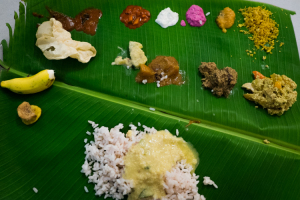
A special thali plate that is served at traditional South Indian celebrations, like the festival of Onum and weddings.
Sign #2: Bollywood films, music and dancing make you so happy you will just burst out into song and dance.
While in Bombay and Trivandrum this visit, I had a craving for a good Bollywood flick. I was so hungry for one that I didn’t mind that the three hour action packed film complete with song and dance was in Hindi without English subtitles. And let me tell you, I didn’t even need them, I was so happy, I was the only one in the theater breaking out in dance anytime the actors would. Have you ever seen a Bollywood film? If you haven’t, you should. Here are some of my favorites to get you started: “Lunch Box”, “Monsoon Wedding”, “Three Idiots”, and “Lagaan”, to name a few. Even though it did not start out this way, the current Bollywood film is filled with a bouquet of song and dance like a musical, it is also known as a “marsala film”. The exotic and colorful settings, along with the emotions evoked in these films, makes me feel alive. So when I was in India, I had to get my fill even if I didn’t understand all of the dialogue. I still got up and danced to the film “Bang Bang”. It had everything you ever dreamed of in a Bollywood flick; singing, dancing, action, family drama, revenge and even a bit of love. No subtitles required for this indophile.
Sign#3: You can’t leave home without bangles as your accessory to every outfit (even western wear).
India is one of the countries where it is recommended to wear the local clothing as a woman unless you want to get stares from every direction. For me, It is one of my favorite reasons to visit India because I love the bright colors. And wearing the local threads adds to the charm and style of India, in my opinion. Truly you can not wear a sari or Salwar-Kameez without the matching accessories. Even though I don’t necessarily wear these local threads everywhere around the world, one Indian trend I can’t seem to live without are my bangles. You can add color and sparkle to any outfit and they go with everything. It is my inexpensive way to wear my creativity on my sleeve (literally). They are becoming pretty popular throughout the states and they may even help you identify an indophile.
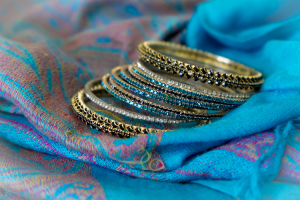
These bangles were given to me by Vinay’s aunt we call Mommi and his brother and sister-in-law Sandeep and Sarita. The only bangles I could take with me for my travels but at least I have them.
Sign #4: You aren’t afraid to use the public toilets in Bombay.
I have even found that some locals would never use these toilets, but when you have to go. . .you know the saying. In yoga, there is a very specific posture that is essential for good kidney and intestinal function, it is also good for releasing the lower back and neck muscles. It is known as the “squat”. This is different then doing squats in body building or western workouts. This position is where you sit all the way down, almost to the ground, your knees nestle up into your armpits. It is a fantastic posture for general health and well-being and it is essential to use the loo in India. Basically a hole in the ground that has a place for your feet on either side of the hole. If you can conquer this act, you can officially call yourself an “indophile”.
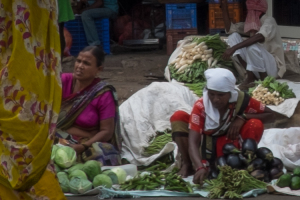
On the streets of Bombay, you can see the vendors even sitting in a comfortable squat as they sell there goods.
Sign #5: You prefer to eat with your hands.
South Indian culture, more than the north, typically eats with their hands, correction, only your right hand (for reasons better shared in person). Even though in India, they will typically offer westerners the option of silverware, if you prefer to eat with your hand you may be considered an indophile.
As you can see I am clearly an indophile myself and with this article I hope to give you full permission to embrace your inner indophile. There are plenty of other reasons to love India’s culture, history and people as I do. Feel free to share your favorites with me in the comments below.
The Mediterranean. Truly one of the most beautiful places on Earth. Jodee and I had the fortune to have visited two amazing Coastlines in the Mediterranean.
The waters are crystal clear and a deep Turquoise blue. The weather, a shade south of perfect, and the people lead relaxed lives putting around on scooters and tut-tutting at tourists that rush through their sleepy little towns.
We took 3 trips along these Coasts.
First, we took a 7 day sailing trip through the Islands of Dubrovnik, Sipan, Korčula, Mlijet, Hvar and Brač.
Following that we rented a car and made our merry way through some coastal towns each blessed with an amazing beach. The towns of Rogoznica and Primošten deserve special mention for their amazing scenery.
Finally, we rented a car in Turkey as well and spent a week driving from the southern town of Antalya, through the beautiful towns of Kas, Olympos, Kekova, and Cesme, through to Izmir, which is close to the temple of Ephesus. Honestly, we were enjoying swimming in the waters so much that we decided to skip seeing yet another ancient ruin (Ephesus), and went to Cesme instead.
I was planning on posting pictures in this blog, but I couldn’t bring myself to pick just a couple. So instead please take a look at these albums on:
Turkey was the first place where I learned to swim. The ocean waters kept me afloat while I slowly learned to stop panicking in deep water. I still panic sometimes so I don’t go too far out yet!
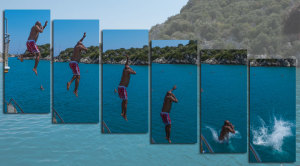
GeronimoooooooSplash!
Our Journey to the quaint little town of Cesky Krumlov started with a train journey from Salzburg.
We get in the first train. It’s sparkling, beautiful, goes at 200km/h, has a full on restaurant and free wifi! On top of that the scenery is breathtaking. We could spend an entire week just sitting in the train enjoying the restaurant the wifi and taking in the scenery. But our enjoyment was cut short just an hour later…
We switch trains to go from Linz in Austria to Cesky Budojevice. Gone is the wifi and the restaurant. The train gets a bit grungier. But it’s still clean enough that you can lie on the floor (which I did, to do my physiotherapy).
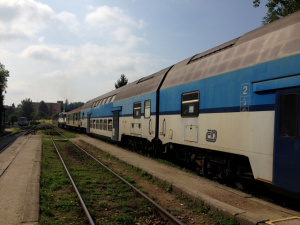
Chug-chugging away
Funnily enough, the initial reason we had switched from Budapest to Salzburg as the transit point from Zagreb to Krumlov was to avoid a broken track close to Budapest. As luck would have it, the track close to Budojevice was broken as well, and we were all carted out from the train and onto a bus to take us to the next station.

So you want to have the romance of the railroad eh?
There, we transferred to the last train to cesky krumlov. Now we were getting very close to Indian Railway standards. The outside of the train was covered with grime and graffiti. The toilets were dirty. Fortunately, the seats, in stark contrast to the rest of the train, were nice and clean. Groaning creaking and with the familiar rhythmic beat that I was used to in Indian trains, we slowly chugged our way to Krumlov.
Cesky Krumlov is a tiny, very pretty little town nestled to the south of its more famous cousin, Prague. Walking through it felt almost like walking through a fairy tale town. The town is resplendent with a plethora of colors and curves.
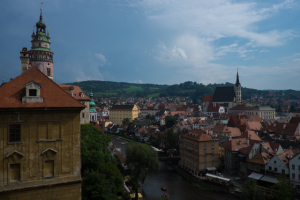
Krumlov Skyline
And interesting street names…
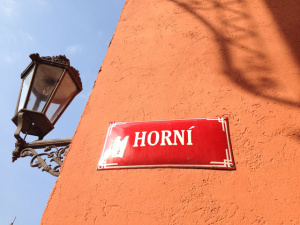
And below it was a sign that said, “For a good time, call…”
Walking through this beautiful city, I was left scratching my head at the style of construction. Builders in Krumlov either seemed to be unable to make up their minds, or had way too much time on their hands. When constructing a building, first they would use bricks and mortar to build it. Then, they would cover the bricks with cement. Finally, they would paint back the bricks that they just covered, painstakingly back onto the cement?!!!!
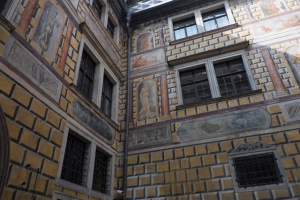
Oh you think those are bricks, do you? Well think again!
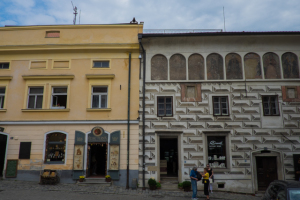
Nope. Still paintings!
Food wise we got to sample a Central European favorite, Pork Knuckle!
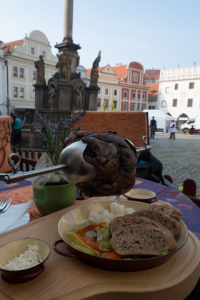
It’s called knucke. But its the knee of a pig. There must be lots of pigs limping around at this rate…
We also enjoyed the best version of a Trdelnik. They are these pastries in the shape of a hollow cylinder made from sugar butter flour and eggs. Delicious Heart Attacks waiting to happen. While in Prague they are just handed to you, in here you could get them coated with Nutella. As if it wasn’t yummy enough…!
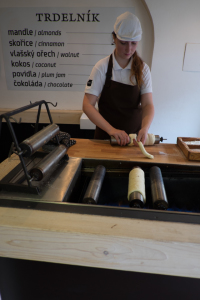
Yummy Goodness!
There was one other interesting thing I noticed though, in Krumlov. And that is the unusually high amount of Asian tourists (specifically Chinese tourists) wandering the town!
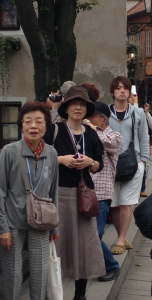
China? Nope, still Krumlov.
There must be a tour company in China and one in Korea that are laughing their way to the bank with Krumlov tours sold, for their is a crazy high concentration of chinese tourists walking the town. I swear, if it weren’t for the signs with a Latin Alphabet and Cobblestoned streets, I would have thought we were in Cesky Peking.
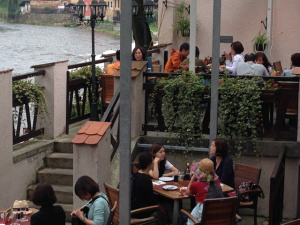
Cesky Peking
Oh and one fine day a bunch of classic American Muscle cars decided to show up in the main town square of Krumlov.
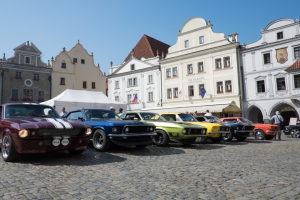
Apparently Krumlov is also the starting point of a few rallies and car club events!
Oddities aside, Krumlov was the perfect small place to enjoy a few restful days. The small town has a beautiful feel to it. You don’t feel rushed, the weather is great, and it’s a good resting spot before immersing yourself in the madness of Prague.
After a relaxing time in Croatia doing my Physical therapy to get back on my feet, we decided to visit the Czech Republic where Jodee’s ancestry is from. I looked at train timetables and found there were 3 routes to get to the Czech Republic. Through Budapest, Salzburg or Vienna.
The train line to Budapest I heard from some fellow travelers was broken. So people were made to get off the train when the tracks ended, take a bus across the broken bit, and reboard another train to continue on their journey! I decided to avoid that adventure and route through Austria. As it turned out, it didn’t matter because the tracks in Czechie were also broken and we had to go thru the same rigmarole there as well!
Now I was left with the tough choice of picking Vienna or Salzburg. Life was tough☺. Since we’d lost a week in Zagreb for Therapy and only had one day to explore any town we went through, I picked Salzburg, as Vienna seemed a much bigger city deserving more days to visit.
And so it was that on a sunny day in September, two weary travelers ended up in the town of Salzburg. This town, contrary to what people might tell you, is famous for one thing and one thing only – The Sound of Music! I hear there is also some musician that was born there by the name of Mozart. But who cares. The Sound of Music!
To prep for our journey into Salzburg, we meticulously watched the movie en route to Salzburg (Nerds Alert!).
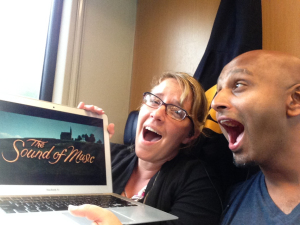
The hilllls fill my heeeeeeeart, with the Sound of Muuuuuuuuuuuusic.
The scenery entering into Salzburg is Breathtaking. I think the countryside in Austria is probably the most lush and beautiful that I have ever seen. No wonder the Nazis wanted to take over Austria (as The Sound of Music chronicled faithfully for us. Yes, I get my history lessons from Musicals.)
The town of Salzburg is a quaint beautiful town as well. I heard that 3 times the population of Salzburg enters the town as tourists due to the Movie alone! Salzburg is overrun with tourists clicking away at the various sites, posing goofily and wondering if a fairy tale ending will happen to them as well. The funny thing I heard is that Austrians aren’t really big fans of the movie at all!
The Sound of Music (I’m going to write SoM from now on to save space) was originally a book written by Maria Von Trapp chronicling her life before she and her family made their way to the US of A to open the Trapp Family Lodge which runs to this day. There was an Austrian movie made that was quite faithful to the book I hear. Unfortunately, it was made with German levels of Accuracy (and Emotional Depth). That movie didn’t fare too well. Come Hollywood, and some producer decides to take the original story, throw away historical accuracies, sprinkle on some good songs, and bang! A legend was born! Though the story now takes lots of liberties from the Von Trapp family’s real story (for instance, they didn’t really escape over the mountains. Like most boring escapes, they just took a train out of Austria), it has captured the hearts and minds of millions of starry eyed fans, and continues to line the pockets of all the tour operators in Salzburg.
Given that we only had a day here, we spent it doing the most important thing possible:
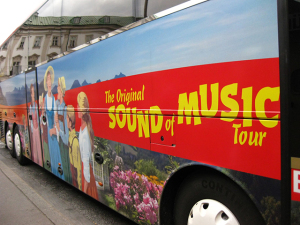
All Aboard!
This was probably the height of Touristic-ness on our trip. It’s tough to beat this. Clambering aboard a bus with a bunch of Movie Geeks, going from site to site where different shots of the Movie were filmed, listening to Songs from the Movie, and taking tons of pictures in front of each and every monument; It was Touristic Hedonism at its most commercial. And we loved it!
Going from the lake into which the kids fall when they see the Baroness for the first time,

Oh Captain! It’s so great to see you….!
To the Gazebo that 20th Century Fox gifted to Salzburg after they were done with the movie, which filmed the 2 love affairs in SoM, viz. the “I am 16 going on 17” song and the “I must have done something goooooooood” song…

I am 36 going on 37, baby it’s time to thiiiiiiiiink
To the big horsey fountain that Maria splashes to reinforce her confidence in herself…

I have confidence I can spray this entire horse with just one splash
To the park where they filmed the “Doe a Deer” song…

Look! It’s a Doe! It’s a Deer! It’s Julie Andrews and the Kids running through the park!

Youuu can siiing most aaaannnnythiiiiiiiing!
Finally to the church where the Captain and Maria get married…

Q: How do you solve a problem like Mariah? A: Get her married!
This was a movie feast, and a perfect holiday from a backpacking quest!
Interesting Tidbit. Other than SoM and Mozart, the other thing that comes from Salzburg, very surprisingly for a sleepy elegant town, is RedBull. The RedBull headquarters are located in Salzburg! Perhaps that was it that gave the Von Trapp family wings to fly over the Alps…
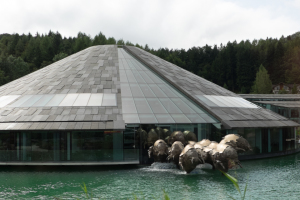
The Red Bull Headquarters just outside Salzburg. Idyllic Countryside? Pfft…
Hvar, one of the bigger islands off the Croatian mainland, has been getting some media attention lately as a tourist hot spot, and for good reason. The island itself is gorgeous.
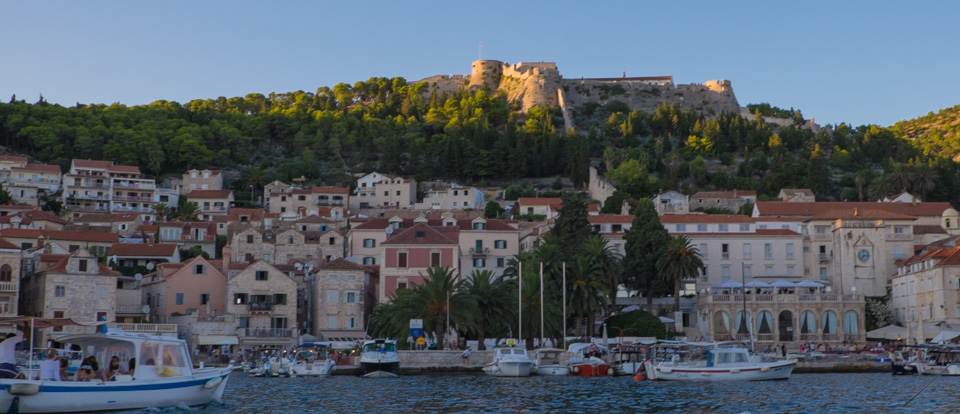
Just Another Place in Paradise
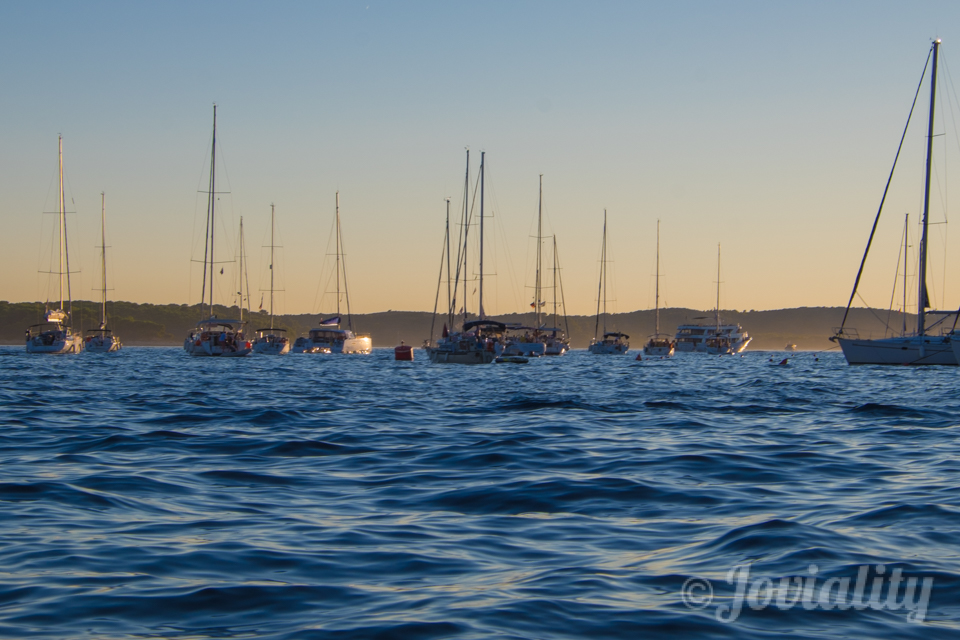
Where anyone with a sailboat to their name (worth more than a million at least) docks harbor at some time in their life…
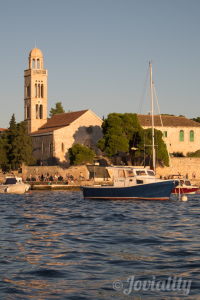
It has luxury accommodations, luxury weather, and lots of options to Party. Apparently it is also a Mediterranean getaway for the rich and famous. A waiter told me that once this ginger haired guy in flip flops came and got coffee and left, and shortly after there was a commotion there as someone recognized that that was Prince Harry!
I was quite taken aback on reaching the island. Never have I seen such a display of wealth in Yachts as before I saw Hvar. For instance I’d never even seen a “SuperYacht” before.
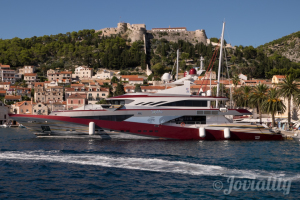
But after seeing some of these floating feats of engineering luxury gently lapping against the docks of Hvar, I quickly did some window shopping to see how much a toy like that would set me back.
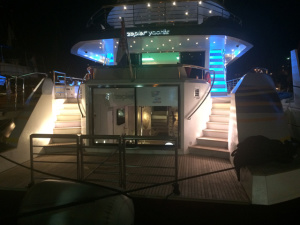
First, I see there’s an entire website that’s like an amazon for super yachts. Then, I see the prices. The cheap ones go for about 12 Million dollars, and I saw ones uptil 66 Million Dollars! If you’re complaining about Real Estate prices in San Francisco, try getting yourself a little floating Studio of about 800 sqft.
After getting sticker shock for something I didn’t even want, as Jodee and I were walking around we see a small sign advertising motor boats for rent for quite cheap… Sometimes we do these experiments with ourselves. One experiment we were running there was ‘First Thought Best Thought’. Which is to express the first thought that comes into our heads, without filters. You should try it sometime. It’s fun! So I had a thought of, ‘It’ll be fun to take a boat and pilot it out’, followed by a flood of ‘Oh no, too dangerous!’, ‘You’ve never done it before’, ‘Don’t be stupid’, et. al. You know, the peanut gallery. But since the first one was to take the boat out, I said that to Jodee. She lit up, and said we should do it!
And so it came to pass that we find ourselves talking to the boat renter.
“Do you have a Boat License?”
“Nope”
“Have you ever driven a motor boat before?”
“Nope”
“Hmmm. Ok, we’ll give you the smaller boat. And a lesson in how to drive it”
“!!!!!”
The lesson was all of 45 seconds long. Essentially he grabs the motor stick (the handle that protrudes from the motor) and says.
“Clockwise fast. Anti-clockwise slow. Left to go right. Right to go left. Ok, off you go”
That was it. Donning life jackets, we were off piloting our first ever motor boat!
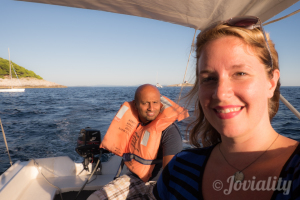
Smiling as we leave the harbor. The smiles lasted for all of 7 seconds…
If you ever want to know how big a wake a super yacht has as it ambles its way across the harbor, try being in a tiny little boat in the wake’s wake. Everytime a yacht passed by, our boat was rolling uppppp and downnnnn so hard I was screaming for my mother, for god, and for anything and everything with my eyes closed. It was probably one of the scariest experiences I have had in my life
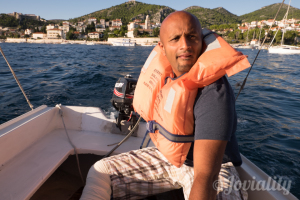
Intense concentration. Is it to pilot the boat, or to stop me soiling my pants?
The initial plan was to go out of the harbor and visit the neighboring islands. But I was so scared being thrown around by the waves (did I mention I hadn’t yet learnt how to swim?!) that we decided to putter around the island to the other side, staying close to the coast in case the boat capsized.
When we got out of the big yachts, we managed to catch some good pics of life on Hvar:
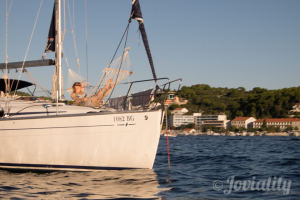
It’s been a hard day’s night, and I’ll be sleeping like a log
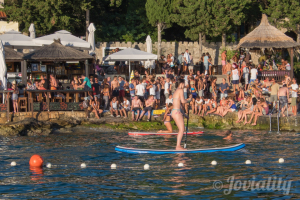
When I was your age, I had to paddle to work, uphill, both ways…
We made it back to land safely, and without sinking back (hence why this blog got written. I dont know if there is internet at the bottom of the ocean). So we treated ourselves to an awesome dinner of, yep, italian food (which is what you mainly get in Croatia unless you wander away into the un-touristed inland villages). the food was good, and the view from the restaurant, breathtaking…
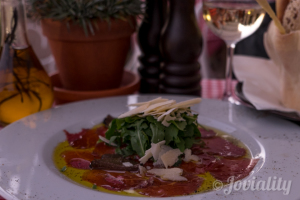
Should we admire the food…?
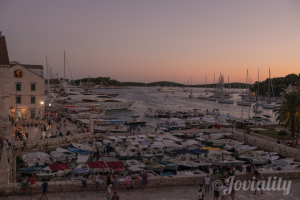
Or the view…? Decisions, decisions.
To see more pictures of Hvar, as well as the other islands we visited, check out our Croatian Islands Photo Album here!
This blog chronicles my experience in getting knee surgery done. If you are looking for some advice on getting surgery done in Croatia, check out my other blog here.
A month into my trip, while running (on a treadmill!) in London, I felt a clicking sound in my right knee. The pain died down after a week of rest and a couple physiotherapy sessions, but then popped up after a couple months. At that time I was in Munich. I decided to get an MRI to see what was up. It would cost 920 USD in a Munich hospital. Not knowing if my insurance would cover it, I elected to delay it by a couple weeks to see how it would feel.
Two weeks went by, and the pain was still there. In fact it had increased. At this time I was in Zagreb, Croatia. While the public healthcare system there offers free treatment to all Citizens, just like the rest of EU, foreigners like myself have to rely on private hospitals. To my good fortune, I found out that though part of the EU, the Croatian healthcare is a whole lot cheaper than the rest of the EU. So much so that, it’s one of the countries for ‘health tourism‘. Essentially a place with good and cheap healthcare where people from other countries fly into for getting their procedures done! I searched for one that specialized in Knee problems. I found two in Zagreb:
I took an MRI with Sv. Katarina mainly because I heard of them first. It was only 200$, a bargain compared to Munich, and magnitudes less than an MRI in the US. Not just that, their customer service was excellent. I told them I wanted my doctor back in the States to review them, and they gave it to me on a CD as well as Dropbox files. Dropbox files from a hospital! Who does that?!! These guys were awesome! My Doctor back in the US, whom I asked for a second opinion, said that was one of the clearest, well done MRIs he had seen ever!
After getting the MRI, I found knee surgeons at both hospitals. The surgeons I found were
Andrej Radić at Sv. Katarina
Mladen Miskulin at Axis
This is one place where I like the US better. We have so many peer review websites where we can read other patients reviews. I use yelp a lot. Out here, you’re sort of shooting in the dark. A review site would be really helpful. Especially for travelers who have no clue where to go.
Both surgeons had impressive Bios on their websites, which was the only source of information I had. I talked to both, and finally decided on Miskulin. Mainly as his schedule and mine matched more closely, and his initial communication with me felt clearer. I loved working with the support staff of Sv Katarina for getting my MRI bills for insurance. My insurance required some US specific codes such as ICD-9 and CPT Codes which it seems no country other than the US uses (Way to go America. Yet another way to be different from what the rest of the world does.). They looked it up and figured it out within a day.
While talking to both doctors, I realized that July August is pretty much the worst time to get anything done in Croatia, as half the country is on Holiday! both doctors were off on their vacations and would only be back end of August. Now, while in Croatia, we wanted to go sailing on the Croatian coast. It’s quite an experience (and yet another blog :))! However they all get booked way in advance, and the only one I got was a cruise on Aug 16-23 starting in Dubrovnik and ending in Split. Initially, both doctors gave me an earliest date of August 25th in Zagreb for a surgery. Doing my surgery on the 25th would mean missing the cruise.
Then Miškulin told me he could do an earlier surgery on the 15th if I were to come to Dubrovnik! This worked out perfectly as the cruise started from Dubrovnik on the 16th! Talk about alignment! I chose that, and scheduled both the surgery and the yachting trip. The yachting trip would be a nice slow recovery time after the surgery.
We flew to Dubrovnik a day early and I found an AirBnb close to the hospital, which had the least number of stairs to climb to it. It surprisingly hard to find apartments close to the ground. They told me that was because of the oldness of the town of Dubrovnik.
The surgery was on a Friday afternoon. My doc was a lot more carefree about the preparations than I was. He just asked me to show up at 5pm. Since I had had knee surgery before, I knew some of the pre-op procedures. I literally had to pull the remaining bits of advice, such as how long to not eat prior, and what pre-lab tests are required (none!).
My first experience was a bit scary, and happened when I asked the anesthesist about the lack of pre-op tests. He replied with a “Well, you look healthy.”
Jodee and I look at each other. Slightly scared look on my face.
“What do you mean healthy?”
“You know, no high blood pressure, diabetes, etc…?”
I started to look worried at the level of prep.
The doc came in and calmed me down. He seemed sure and definite and talked about how the tests were primarily required for general anesthesia. Since mine was local, it wasn’t required. I remembered that to be the case as well. Ok, we proceeded with the surgery.
As it turned out, I couldn’t take the pain with the local anesthetic (yes yes I’m a big wimp), and the doc made an executive decision to do general anesthesia without telling me! Coz the next thing I knew, I was sitting on my bed. It was 3 hours later. And half the staff had left. Fortunately, nothing went wrong. But this part was still a bit sketch.
After surgery I go on the yacht cruise for a week. The Croatian islands are beautiful, and I’m glad I got to enjoy them from the boat.
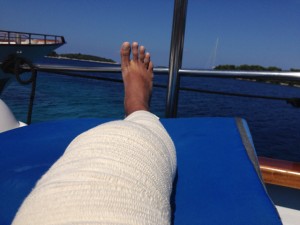
Suffering Post-Op. 🙂
The post-op advice was like the pre-op advice. Minimal. “Walk normally, and ice”. That was it. As it happened. The next few days I “walked normally” for a couple hours each day. And my knee began to hurt. Quite a bit. So I call the doc from the yacht and tell him that. He replies. “Well, walk normally but don’t exaggerate.” The precision of his advice was almost overwhelming. So I get on the Internet and research post-op surgery, as any anal retentive researcher is wont to do. Thankfully I got a bit more advice.
A week later, we drive back to Zagreb after the cruise.
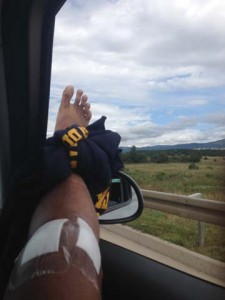
Well, Jodee drives back while my leg makes like a dog and gets a breath of fresh air
I’m back in Zagreb, my knee still hurting and now walking in crutches, I go to my post op meet.He asks me to stay back for a week to get physical therapy. That was a blessing. For after a week of the physical therapy, my knee was almost as good as new.
Physical therapy here seems way better than what I got in the US. In the states, a session lasted one hour, and they did electrical stimulation, and a couple exercises.
In Croatian private clinics, I got the royal treatment. The moment I got in, I got 10 min each of ultrasound and laser therapy, followed by two types of electric stimulation. One for knee and one for the muscles around it. Each for 20 minutes. This was followed by 35 minutes of magnetic therapy, a 10 minute knee massage, an exercise program and finally a 15-min ice machine! Each session lasted about 3 hours!
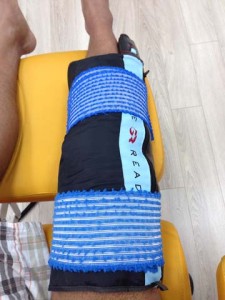
Plugged into the ice machine
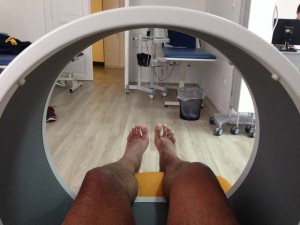
Magnetotherapy
And since I was only there for a week, I went for 2 sessions, and put in an hour of swimming at the free Zagreb outdoor pool…. 7 hours of physiotherapy a day! And I loved it. I would walk in and sit on the comfy leather chair to get plugged into the various therapy machines. I would take out my laptop and connect to the really fast wifi in the office. They would plug me into the different gadgets for the different therapies, and provider with unlimited cappuccinos. It was pretty much like being in a caffe in Croatia, with soft music piped through the wall speakers as the electric machine softly hummed my cartilages to heal.
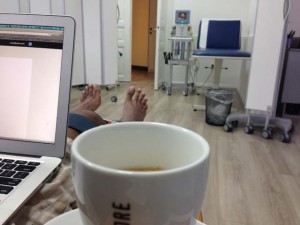
Caffe Etela!
A week of physical therapy and my knee was way better. Special thanks to Marko and Dunja, my therapists who worked day and night!
Now onto the rest of Europe…
Ljubljana, Marko tells me, is not a Slovenian word. However, if you change one letter, then it becomes Ljubljena, which means, ‘The Woman I Love’. We spent some time sampling the coffee there (not my favorite), followed by the food (which was good), during which time Marko educated me on the differences between Croatian and Slovenian language.
They are very similar, much like Mexican & Argentinian Spanish, and the letters are pronounced like most Germanic languages. The only difference is the addition of the single accented consonants (such as ć and ś) which are found only in Croatian, and double accented č, š and ž, which are common to both Croatian and Slovenian. An accent implies pronouncing the letter with an ‘h’ after it. The single accent being a soft h and the double accent, a hard h. The only other language I am familiar with that does this is Malayalam(ć being similar to ച് and č to ച്ച്. ś to ശ് and š to ശ്ശ്. The difference here is that they also start words with the hard č and š, unlike Malayalam where you cannot start words with ച്ച് and ശ്ശ്).
One interesting difference was in how numbers are spoken. For double digit numbers, e.g. 52, a lot of languages say fifty-and-one, such as
English: Fifty Two
Spanish: Cinquenta y Dos
While some other languages reverse it, like
German: Zwei und Fünfzig
Numbers in Croatian and Slovenian are almost the same, with a confusing difference that Croatian speaks it the English way, while Slovenian does it the German way!
So for 52, where 50 is Petdeset, and 2 is Dva:
The Croats say
Petdeset Dva
While the Slovenians say
Dve I Petdeset
That should make for some interesting conversations when a Croat crosses the border, or vice versa. For instance this German friend of mine once was giving us a headcount, and said ‘We are One Fifty people here’, when there were 51 of us… Oh joy!
After Ljubljana, we drove over to Marko’s uncles farm house to spend the night. It was a cute house in the countryside with a farm! The farm had a mild mannered german shepherd named Aska, a bunch of rabbits, chickens, and horses.
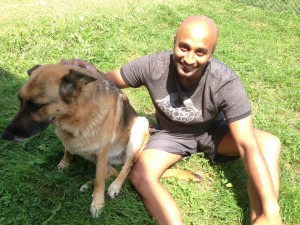
Aska & I getting along well. 🙂
Marko’s cousins Katja and Tina took care of the animals on the farm, in addition to having full time jobs. They’d wake up at the crack of dawn to feed the animals, clean the area, head off to work, come back, and continue with their farm duties. And we think we are pressed for time…!
They were expecting us, and had prepared all sorts of goodies for us to eat. It was a great Welcome!
Tina was a horse trainer, and was gracious enough to teach me how to ride a horse. Much like training dogs, where you need to be the alpha, I needed to be firm with directions and start/stops. The first few times I was being ‘polite’, and she (the horse) totally ignored my requests and decided to hang around with Tina and the others. It was only when I started being specific and deliberate that she finally decided to listen to me. Then we had a nice time trotting around the paddock.
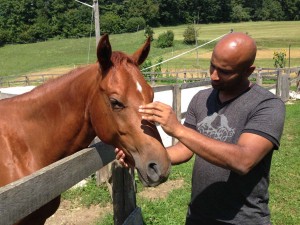
Who’s a good horsey then? Who’s a good horsey?!
While seeing castles and churches are all well and good during traveling, it is experiences like this, where you get welcomed into the house of new friends and get to witness how a different culture lives, that, for me, make traveling such a rewarding experience. I have Marko, Vero, Vojč, Tina, and Katja to thank for making my Slovenian sojourn such a memorable one!
P.S.: And Giovanni for introducing me to Vero. ☺
P.P.S: Check out the Slovenia Album page for all pictures of my Slovenia Trip!
On my way back from getting an MRI in Croatia, I took a detour up a mountain (heck, I had a rental car, a full tank of gas, and 16 hours to return it. What would you do?). Up at the top, close to the Skiing Town of Sljeme, was a cafe where I had a real tasty Apple Strudel and ended up posting it’s picture on FaceBook.
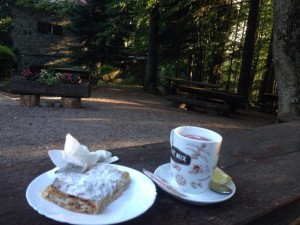
Apple Strudel on a Mountain Top
Privacy issues aside, this is one of the reasons why Facebook is so awesome. Just a few hours after I had posted the picture, my friend Veronica whom I know from San Francisco messaged me asking if I was in Croatia. As it turns out, she was at the moment in Slovenia with her husband, Marko! Not only that, they were in a town called Senovo which was just an hour away from where I was! We excitedly made plans for me to visit them that weekend. Saturday, I get on a train to Slovenia. Trains in Croatia and Slovenia seem to be freebie canvases to all the resident homeless artists, much like the alleyway walls of most major cites.
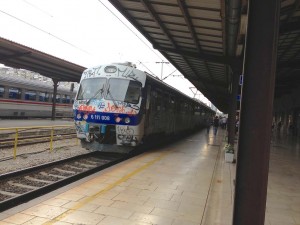
Slovenian Mobile Easel
After being subjected to the scrutiny of the sternest passport officer I have met at Dobova, who actually moved around to view my face from multiple angles to make sure (really sure) that the passport was legitimately me and not some gypsy trying to sneak his way in, I arrived at Krško. There I was met warmly by Veronica, Marko, and his dad, Vojč. As far as dads go, he is the cheeriest person I have met. Everytime I met him he would always have a smile on his face, and usually a Pivo (Beer in Slovenian) in his hand.
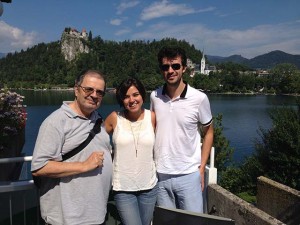
Marko, Vero, and Vojč
Our first stop was the town of Bled, on the opposite end of Slovenia. The journey from one end to the other only took 2 hours. Slovenia is a small country, mostly covered with a lot of greenery. Unlike countries like Austria and Belgium where even the trees sprouting the countryside seem to be lined in order, as if planted by Mother Nature’s OCD Aunt,
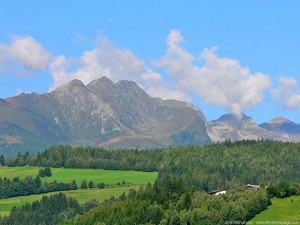
The Austrian Countryside. Note the regularities of the trees.
The trees adoring the sprawling countryside of Slovenia were spread thick all over the mountains. Irregular and bunched together, this appearance is what I think gave Slovenia its nickname, “The Broccoli of Europe”.
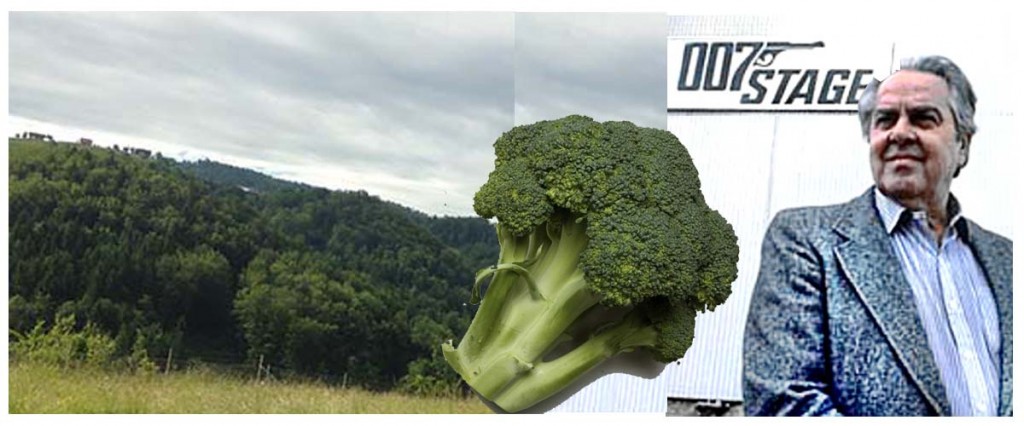
See?! Can’t tell one apart from the other, can you?
Bled is a beautiful town with a lake of the most Turquoise colour I have seen.
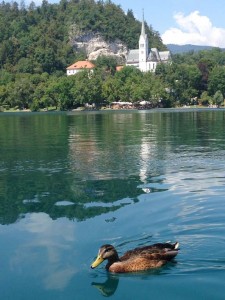
Castle Bled
There are tiny Ferry boats made of spruce wood whose orangeish tinge perfectly match the turquoise waters. The whole scene was like a picture postcard manufacturer’s dream.
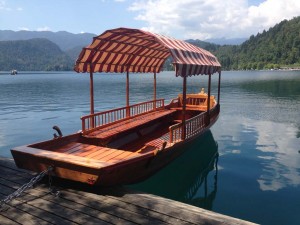
Boats that take you to the Castle
We spent a relaxing morning here, spending a couple hours sauntering around the lake shore and a beautiful island in the middle of the lake,
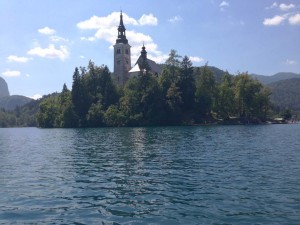
Island in the center of Lake Bled
We finished off the visit with a sampling of a Kremšnita, a custard cream cake native to Bled. After that, we all headed over to Ljubljana, and Marko’s cousins’ farm. You can read about that in my second blog on Slovenia.
Also, check out all photos from my trip to Slovenia here!
In this post I’d like to tell you a bit about the interesting coffee culture of Croatia, and what to do if you’re a tourist without a ready kitchen while in Croatia (hint, it’s not good!)
My morning breakfast is usually a Coffee and a Pastry (In retrospect, as I write this blog 3 months later, that breakfast was primarily responsible for about 15 pounds of weight gain. Kids, don’t try this at home. Or anywhere else for that matter!). While in most places (Well, most places in Eurameritralia at least) this can be accomplished simply by going to a Café and ordering one of each, in Croatia, this requires visiting first a Pastry Shop to get the Pastry, and then a Café to get the Coffee. Talk about singular focus on core competence!
It comes down as follows. Croatia has a culture of ‘Caffe Bars’, which are exactly what they say: A Café and a Bar. They serve all sorts of espresso drinks and juices, that you get in a café, and all sorts of Bar drinks, such as soft drinks and Alcohol. Cafes seem central to Croatian hanging out culture. Come weekday or weekend, rain or shine, there are almost always tons of people hanging out in the myriad cafes in the myraid-er alleyways in Zagreb. If you were in August, you would probably have found me there as well.
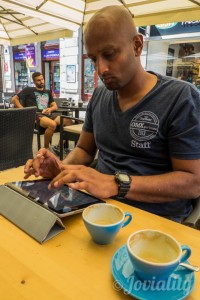
Blogging Away at Express, one of the two best Cafes in Zagreb
What they don’t serve is any sort of pastries, sandwiches or any solid food at all. So unlike cafes elsewhere, where you could get a coffee and a pastry or a sandwich (or a Chatpata Paratha Wrap if you are in India!), here you bring your own food and have it with your coffee. This is made convenient by neighboring establishments called ‘Pekaras’ or ‘Pekarnicas’ (Bakeries) where they sell only Pastries and Sandwiches.
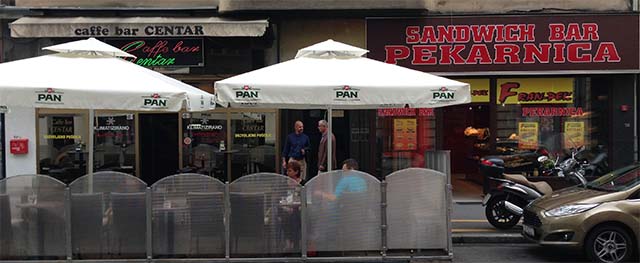
Typical example. A Caffe where you get just the coffee, with a neighboring bakery, where you get just breads!
I couldn’t figure out what resulted in this kind of a system. Talk about focusing on your core competence and outsourcing everything else!
The other unusual part of Caffes is that they only do Espresso. There is no concept of Drip Coffee.
If you ever find yourself in a Croatian Caffe Bar looking incredulously at the menu, here is a tiny guide to help you:
I soon realized that to get what I considered a Cappuccino, I needed to order the Kava s Mlijekom.
After a week, I was really excited upon finding the 2 places in Zagreb that actually do a Cappuccino the way I’m used to – complete with micro foam and artwork! Express Cafe Bar and Elis Caffe. These 2 cafes have Baristas that partake in the Barista competitions and know their coffee. Also, Croatia is blessed with good milk, so the Cappuccino in these places are really good.
Now that we talked about my favorite subject of coffee, let’s come to the topic of food in Zagreb (and indeed, in many towns in Croatia).
I have to start by saying that I love the country of Croatia. It has a rich history, beautiful cities, an amazing coastline, and an honest and hardworking people. The food here, unfortunately, was the most disappointing bit of our entire stay in this country.
This would be my take on how you would create the cuisine if you were the God responsible for the creation of Croatia. You take middling Italian food, blend in some middling Greek food, and throw in a pile of grilled meat, and you pretty much have it.
Most Croatian restaurant food can be summed up in 3 words, and this restaurant did so very aptly:
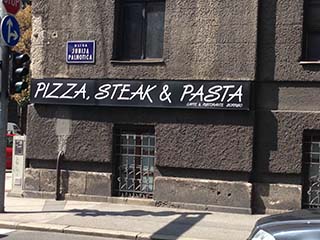
The name is the menu. Efficiency!
That was pretty much the fanfare at any Croatian restaurant we went to. The main difference between the menus of different Croatian restaurants is the paper that it is printed on.
They all have the same set of the following:
Čevapi is a grilled meat dish which is essentially a Smorgasbord of different meats, with some potato fries on the side and the odd tomato added for garnishing.
Now the list probably looks like a decent amount of variety. But just try the same menu everyday for 3 weeks, and you’ll soon be resorting to hunting around grocery stores and the like. Speaking of grocery stores, I found the very best flavored yoghurt in Croatia. It’s Pista&Almond flavored yoghurt with real Pistachios in it! We spent many an afternoon feasting on just this!
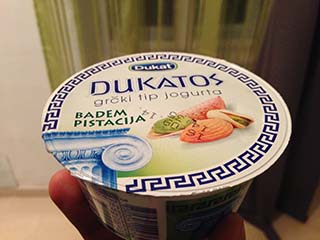
Yes I know it’s greek. I don’t care. It was awesome!
Now I ended up spending 6 weeks in Croatia finishing up my Physical Therapy. As you might guess, the last couple weeks were spent searching high and low for any place that served non-Croatian food. In Zagreb I finally found a few and was happy. In the small touristy coastal towns, unfortunately, unless you’re willing to take a car and go hunting outside the coastal towns for food, you’re pretty much stuck with same ol’ Pizza Pasta etc… I had to make up for the lack of flavor with the view. And make up it did. The Coastal towns are some of the most beautiful towns I have seen in my life…
Now I’m sure that in every town, if you go outside the main areas you might find more variety, and the locals know these places. But as a traveler, you spend most time around the center of most towns, and this was unfortunately the only options we had there…
If you do end up going to Zagreb, these are a few of my picks to get a respite from Croatian Pizza Pasta Čevapi:
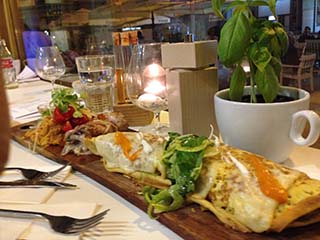
Mundoaka Magic!
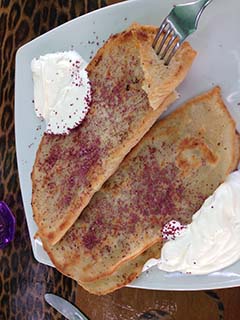
To be fair, we did get excellent, tasty, Croatian food one evening. It required taking a taxi out of the town center to probably the parts where the locals camp out! The place was called Stari Puntijar. It was in a hotel that was converted from a castle, and is worth going there just for the décor! I hear it’s used by the Government officials for their formal dinners. If you want to sample Croatian food that’s not the staple tourist fare, go there.
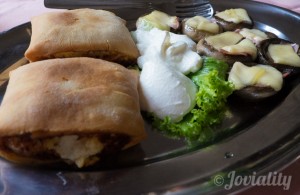
Struklji Roasted & Stuffed Mushrooms
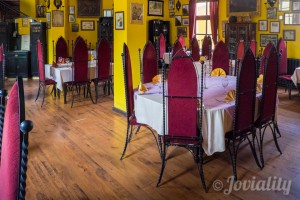
Fit for a King!
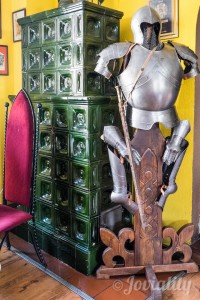
Apparently the owner likes to don this and go partake in Medeival fairs!
After 3 months of traveling through countries where the sun is worshipped fervently because it only makes an appearance rarely, I arrived in Croatia, a Mediterranean Sun Kissed land blessed with miles of beaches and over a thousand islands.
Having only heard about the country recently (embarrassingly enough), I tried to remedy by ignorance by learning a bit about it. Here are some interesting tidbits I learned.
As far as countries go, it’s brand new, having been formed only in the 90s when Yugoslavia split up in a Civil war.
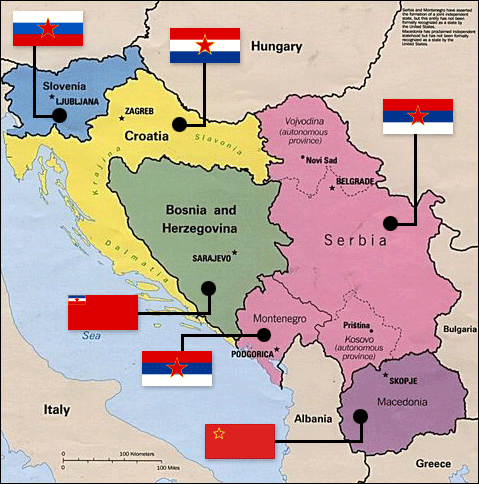
Yugoslavia and it’s Republics. Image courtesy of www.ciee.org
Prior to that, it existed as a Republic of Yugoslavia. It seems that Croatia got the lions share of the coastal land from the other republics when it was formed, almost as if the Croat king secretly told its people “All right, all of you quickly go and stand along the coast. Now!” That ended up nearly locking out their southern Neighbor, Bosnia, from having any coastline at all. But they weren’t having any of that. Somewhere in 1699 they laid claim to a town called Neum, squat on the coastline that Croatia was trying to get. So now the southern most coast of Croatia, which has the famous (and annoyingly touristic) town of Dubrovnik, was cut off from the rest of Croatia. In fact if you’re driving along the coastline of Croatia to Dubrovnik, you have to cross the border twice! Once into Bosnian territory and then out.
For Jodee and I, Croatia was supposed to be a quick stopping point towards the end of the European leg my trip where I’d meet up with friends, and then have Jodee join me from Chicago before moving on. As it happened, my knee started to hurt pretty bad and it turned out I needed a minor surgery to get back full mobility. It’s tough be a wanderer hopping on one leg. So we ended up staying back and taking in Croatia while I underwent my surgery and did a bunch of physical therapy. You can read about that here (blog coming soon…)
The good side is that we got to spend a month and a half in a beautiful country, make some new friends, and learn some Croatian.
I arrived in Croatia by taking a bus from Munich, through Slovenia, and ending up in the Island of Pag.
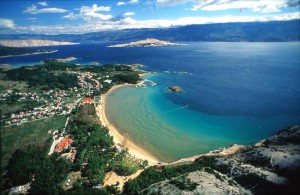
The Pag coastline as we drive onto it from the mainland
The island of Pag, to put a broad stroke of generalization on it, is the less glamorous and cheaper cousin of Hvar, the Mediterranean partying and Yachting hotspot. We visited Hvar on a yachting trip from Dubrovnik to Split. More on that later.
Pag is known for 3 things:
Though Croatia is supposed to be cheaper than the rest of Europe, I found prices here still pretty high. I soon learned that the tourist season in Pag is essentially for 3 months. During those 3 months, the locals make enough money to last them 12! No wonder then!
Pag was a beautiful place to hangout with friends. We spent a good 2 weeks here taking in the sun and the DJs that flew in to perform. Or at least, we spent 1 week doing all that. During the second week, as I found out, the country of Italy had a national holiday. And so we had an Italian invasion as bus after bus of loud, drunk Italians swarmed the entire island, yelling phrases in Italian to each other.
After spending the next 5 days pushing through throngs of drunk Italians to get from A to B, we happily left and went on to our different destinations.
I took a bus to Zagreb where I spent the next week recovering, prepping for Surgery, and getting disappointed with Croatian Food. I’ve written more on our experiences with food in Croatia in my next blog.
After my surgery, Jodee and I spent the next couple weeks taking a sailing trip from Dubrovnik to Split, followed by a road trip up the coast, back to Zagreb. More details on that coming as well!
In my hometown of Kerala, we have a sizeable population of Christians. Among the many fun things they do (like fruit cake infused with rum!) is making homemade wine. Kerala wine is made from grapes (usually) and during festivals (usually). It is a light red in color, has a tingly sweet taste, and is served chilled.
Growing up in Kerala, this tasty sweet nectar was what I came to know and relish as wine. Hence imagine my surprise when, upon arriving in California, I see the people there losing their pants over this bitter dark red liquid that they called wine. Not only did it not sit well on my tongue, but it also came with names pronounced nothing like they were spelled. If you are from Kerala, and reading this, let me give you a few examples:
One of the popular bitter red liquids is spelled Pinot Noir, but they say ‘Pee-No Nuah’. Then you have Cabernet Sauvignon pronounced ‘Kya-Burr-Nay Saw-vee-nyon’. Don’t even get me started on Gewurztraminer.
As if that isn’t enough, you have people with real jobs and decent IQ scores spending hours debating and arguing over which region in some faraway village in France or Chile had the right temperate climate for growing grapes with the right amount of ‘tannins’ (something that made the wine more bitter. Why would you even want to do that?!). It’s not uncommon in yet another overpriced and underlit wine bar in San Francisco to hear a heated debate like, “Yes perhaps the Rio Negro region in central Argentina has 72% humidity, right for Malbec grapes, but in the Bordeaux valley behind my uncle’s house there is a 1 square meter area where his poodle used to pee that has soil with just the right concentration of nitrates to grow grapes suited for Vintage Merlot”. All this energy expended for fermented grape juice that someone forgot to add sugar to.
Now that I got that off my chest, back to Kerala Wine. Last week I was in Porto, Portugal, which is known for Port wine. In fact, just like you cannot call sparkling wine Champagne unless it is grown in the Champagne region in France, you cannot call sweet wine Port, unless, you guessed it, it is grown in the Porto district.
Porto is a beautiful city with lots of hilly roads similar to San Francisco & Thiruvananthapuram, and insanely high bridges like this one:
I came to Porto to join my friend Rodrigo and a bunch of his pals to spend a guys’ weekend doing guy things like imitating the Reservoir Dogs
and wine tasting
There are 4 main types of Port wine: White, Rose, Red, and Tawny. Then you have a couple fancy ones like Colheita & Vintage. I have had Port wine back in the US, and it was always the Red category. I didn’t know the other kinds existed till my visit here. I first tasted the white and red, and it was good. Sweet fruity all round goodness.
Then I tried the Rose Port. With the first sip, memories of Christmas in Kerala came flooding back. Suddenly, like a game of Nostalgia Tetris, it all fell into place!
I’m extrapolating here, so the rest is just theory pieced together from talking to local Portuguese folks and Wikipedia, so bear with me for any historical inaccuracies:
Kerala Christians came about as a result of conversion to Christianity by Portuguese missionaries who arrived after the first Portuguese explorer, Vasco Da Gama. Hence it would totally make sense that the wine that they brought would also be what continues to be made in Kerala. (Edit: From my friend Praveen, a bonafide Kerala Christian: Christianity came to Kerala in 52 AD brought in by St Thomas, a Jew. Not by the Portugese who converted or tried to convert existing Syrian Christians into Catholicism . Also, wines existed in Kerala much before the Portuguese came. They were made by the jews and were fairly sweet. So it would seem that while the mystery did get solved for me, the wines have nothing to do with the Port wines in Portugal after all…)
One interesting bit of info was that till recently the only Port wines sold in Portugal were White, Red and Tawny. The Rose wines started to be sold only a few years ago. So our wine guide was a bit puzzled when I told him we had Rose port equalents for a couple centuries at least in Kerala. Then he told me how that possibly could have happened. To make Red Port, the grapes are first crushed, and then filtered to remove the pulp and skins. After that, the skins are re-introduced into the liquid for the wine to get it’s dark rich color. For this the skin needs to be separated from the pulp and then re-introduced. If that process is skipped, what you get is Rose wine. So years ago, it’s quite possible that the technique of reintroducing the skins was not practiced. Also, the wine needed to sit in the casks for quite a few months for the color to spread. Rose wine (& Kerala wine) is only fermented for 2 weeks maximum before it is bottled and drank.
So there you have it. Portuguese Port wine in a certain form still being made in Kerala! A couple points still nag at me though. Namely:
If any of you readers have an idea, please let the rest of us know in the comments below.
On a rainy Monday afternoon, I ventured out to try one of Scandinavia’s time honored traditions. This is the story of how to get in and out of one (relatively) unscathed…
These are guides to the cities I have spent a decent amount of time in, and would be used by a carbon copy of me. If you’re not a carbon copy of me, well then, it’s all right. Not all of us can be perfect :).
I spent 2 weeks in this town, and the neighboring islands. In summer, the sun stays up till midnight! Dims itself for a couple hours (seriously, the night sky never goes completely black), and then comes up again at 2:30 in the morning! This is perfect if you’re pulling an all-nighter, but otherwise you better have solid blinds or a good eye mask. I made real good use of my sleep mask here.
Since for 9 months of the year the weather is dark and dreary, the Swedes really appreciate the 3 summer months and make full use of it! You will find people on every park, every café, and every place with a half decent view soaking in the Vitamin-D.
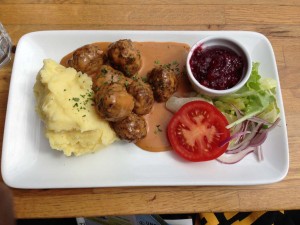
Swedish Meatballs. Not easy to find in Stockholm which has more Italian places than Swedish. Most traditional Swedish places cater to tourists and make you pay through the nose for it. I finally found this dish in the Archipelago (on the island of Vaxholm) for the ‘cheap’ price of 14$. If you want it cheaper, go to the Ikea in Emeryville, California. 5.99$ and just as good! 🙂
is a nice area with a slightly calm vibe, lots of young folk and good restaurants and bars. The swedes say it has a ‘hipster’ vibe, but they got nothing on good ol’ San Francisco hipsters with their tight, torn, black skinny jeans. Oh SF how I miss you.
Ostermalmis a fancy shmancy rich neighborhood, like the Marina in SF, or Chelsea in London.
Norrmalmis good if you have kids and want to hang out with the stroller crowd.
Gamlastanis the old town. Incredibly touristy and expensive. Avoid.
I picked Sodermalm, and was happy about my choice. In Soder (as the Swedes call it), my favorite areas were Mariatorget and Nytorget.
Google Translate: Incredibly helpful at figuring out signs and menus
Stockholm T-Bana: the underground metro app
Google Maps: Amazing at telling you about metros and buses. The only thing it did not work well for were the ferries.
Yelp is completely useless. You find reviews written by 2 people and a moose. Sometime not even the moose.
Waxholmsbolaget: You will need this if you are taking a ferry to visit the archipelago (and you should!)
Other than the standard touristy stuff, here were a few places I liked:
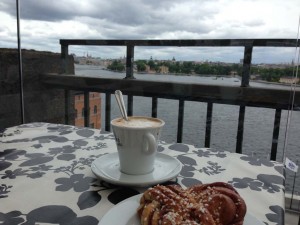
Cafe and KanelBulle. Snack for the Swedes and Crack for me. I think 7 of the 10 pounds I gained in Europe can be attributed solely to this.
The quality of coffee in Sweden is on the average really good. Hence almost any café or kaffe you go to will have a decent Capp. One thing I did like is that, unlike San Francisco, good coffee does not imply snobbish Baristas.
A few of my favorite places:
One point definitely worthy of note: All Cafes have lactose free milk!!!!
These are guides to the cities I have spent a decent amount of time in, and would definitely be useful to a carbon copy of me. If you’re not a carbon copy of me, well then, it’s all right. Not all of us can be perfect :).
I used the Heathrow Express. Totally recommended if you don’t mind shelling out some extra cash for the comfort and speed of it.
I stayed in Paddington, Shoreditch, and Covent Garden.
Paddingtonis decently central, but not really close to anything fun. The one really good thing about it was its proximity to Edgeware Road. The best Persian and Middle Eastern Restaurants are on this road close to Paddington. One I really liked was Café Helen.
Shoreditchis hipster central. If you miss the Mission District in San Francisco, then Shoreditch is the place for you.
Covent Gardenis extremely central to everything a tourist would want to see, Picadilly Circus, Oxford Circus, Westminster (the clock and the Abbey), Leicester Square (which for some confusing reason the brits call ‘Lester Square’).
If you have the money, I’d recommend Covent Garden or South Kensington (a very similar feel).
For a bit cheaper you can stay in Paddington/Shoreditch/Kings Cross.
http://www.gumtree.com: Like Craigslist. A lot of locals listing. I found a really good deal in Covent Garden (50 pounds a night for a studio) here. It helps to have a UK number here so you can have them call you back. You see a lot of options for Kilburn and Aldgate East on this site. I would avoid them. They were very residential areas.
http://www.spareroom.com: If you want to find a shared flat. Popular over there.
http://www.airbnb.co.uk: The Staple. Always good.
Hype!: iPhone App that shows cool stuff in SoHo and Shoreditch
Yelp: I found was not very reliable due to a lack of a sizeable quantity of reviews
Tube Map: Offline London Underground App. You will need it as there is no Cell Phone reception underground.
Other than the standard touristy stuff, here were a few places I liked:
And here were a few places I disliked, although they were supposedly ‘popular’
As always, I look for good Cappuccino wherever I go. London wasn’t a good place to find good espresso. Good tea is really easy to come by. But for coffee, these are the few places I found that I liked:
In any of these places, grab a copy of the ‘London Coffee Guide’. It has a bigger listing of good coffee shops around London.

Things to Ponder

Things to Do, Things to See

Things to Do, Things to See

Things to Do, Things to See, Travel Guides

Things to Do, Things to See

Things to See, Travel Guides

Culture Shock, Things to Eat'n'Drink

Things to See, Travel Guides

Things to See

Things to Do, Things to See

Things to See

Things to Do

Things to See

Things to See

Things to Do, Things to Eat'n'Drink, Travel Guides

Things to Do, Things to See

Things to Eat'n'Drink

Things to Do

Travel Guides

Travel Guides
